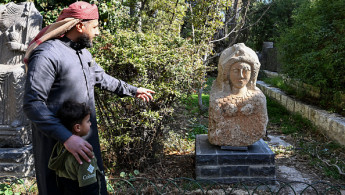Breadcrumb
Safe from looting, Damascus museum reopens a month after Assad's fall
Syrians returned on Wednesday to the national museum in Damascus, reopened for the first time since opposition forces seized the capital and ousted president Bashar al-Assad.
The antiquities museum closed its doors on 7 December, a day before Damascus was taken by rebel forces, over fears of looting.
"We firmly shut the museum's iron doors after we saw the situation was unstable," said Mohamed Nair Awad, head of the national antiquities authority.
In the early hours of 8 December, after Assad had fled and as rebels approached the capital, many soldiers and police officers from the forces of the deposed president's government quit their posts.
With checkpoints unmanned and no security personnel outside public institutions, looters were able to enter the central bank, several government ministries and other buildings.
Awad said his team immediately reached out to the new authorities, led by Islamist group Hayat Tahrir al-Sham.
"They sent us a group of fighters to protect the museum," and it survived unscathed, he said.
On Wednesday, members of the public walked around the building and admired its collection.
Archaeology student Shahanda al-Baroudi, 29, was giving a friend abroad a tour of the museum via video call.
"When the regime fell, I remembered scenes from the Baghdad museum after the fall of Saddam Hussein and feared I wouldn't see the artefacts again," she said.
"I cried when I came back and discovered it had not been damaged."
The Baghdad museum's collection was decimated by looters in the chaos that followed the 2003 US-led invasion of Iraq.
Outside the Damascus museum, Iyad Ghanem was among a group holding up signs demanding the new rulers help preserve the country's cultural heritage.
Some artefacts at the museum date back more than 10,000 years, he said.
The museum's vast collection includes tens of thousands of pieces, ranging from prehistoric blades and Greco-Roman sculptures to Islamic art.
The museum was closed for six years during Syria's civil war, which broke out in 2011 with the brutal repression of anti-Assad protests, to protect its precious artefacts from violence or looting.
It reopened in 2018, after Assad clawed back control of large swathes of the country.






![Anthony Blinken speech [Getty] Anthony Blinken speech [Getty]](/sites/default/files/styles/image_684x385/public/media/images/6263436E-8ACD-4D3C-9055-25A7BE79DD5A.jpg?h=d1cb525d&itok=fLHmHCRG)
 Follow the Middle East's top stories in English at The New Arab on Google News
Follow the Middle East's top stories in English at The New Arab on Google News
![Hajj Saudi Arabia [Getty]](/sites/default/files/styles/image_330x185/public/2157179630.jpeg?h=a5f2f23a&itok=kuo1G9Hw)
![French President Macron [Getty]](/sites/default/files/styles/image_330x185/public/2192150629.jpeg?h=a5f2f23a&itok=_lRlOebg)
![Gaza death toll [Getty]](/sites/default/files/styles/image_330x185/public/2192491071.jpeg?h=a5f2f23a&itok=1V9vL9X5)